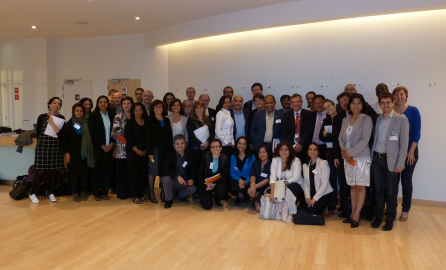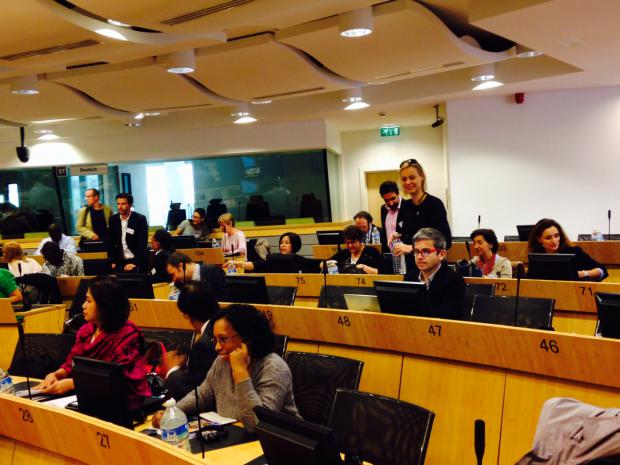Director General of DG DEVCO and Chair of the Policy Forum on Development (PFD), Fernando Frutuoso de Melo, opened the forum’s meeting in October last year by talking about the importance of 2015. "It is the end of the Millennium Development Goals, and a whole set of new, universal goals will be negotiated in the United Nations. It is also the year of the international climate negotiations in Paris, where hopefully a new consensus on combatting climate change will be reached. For that reason the European Union decided to follow your suggestion and have the first ever European year dedicated to international cooperation and development."
Linda McAvan, a Member of the European Parliament and head of its International Development Committee, said it was incumbent on civil society organisations (CSOs) and local authorities (LAs) to make the European Year for Development (EYD) 2015 as inclusive as possible.
“It was lobbied for by the NGO community and people wanted to put development on the forefront of the agenda in 2015, so we have to make it work. It can’t be about events in Brussels, it has to reach out to communities. And I think local authorities are a very good mechanism to have that debate at public level.”
| Learn more: Public Group: European Year for Development 2015 Stakeholders |
Participants at the PFD’s second global meeting in Brussels discussed how to implement and share ownership of the post-2015 agenda and the Sustainable Development Goals (SDGs), which will be adopted in New York in September. Other topics on the meeting's agenda included how to create an enabling environment for CSOs, facilitate greater involvement of LAs and other development actors, and the challenges of urbanisation, given that one in seven people worldwide live in informal settlements.
Many speakers expressed the need for individuals, EU Member States, civil society and local authorities to take ownership and play a more active role in the design, implementation and monitoring of the SDGs than they had in the previous Millennium Development Goals.
Josep Roig, Secretary General of United Cities and Local Governments, said that in order to have the highest impact, the SDGs (currently made up of 17 goals and 169 indicators) would be better carried out at the territorial level by local authorities.
“The municipality of Sao Paulo at this moment has 176 sustainability indicators, and they are managing it. So I cannot accept that we are not able to manage 17 goals and 169 indicators. Maybe the UN is not able, maybe national governments are not able, but local and regional governments – we are able to do that!”
The session on an enabling environment for CSOs and LAs saw Cornelius Hacking from the Dutch Ministry of Foreign Affairs present his government’s Dialogue and Dissent policy, under which 25 CSOs will be chosen as strategic partners to work with the Minister for Foreign Trade and Development Cooperation between 2016 and 2020. These partnerships will involve working together towards a common goal that is difficult for a partner to reach alone.
In the same session, Thomas Hansen from DEVCO presented the Civil Society Roadmaps, part of the Commission’s response to the 2012 Communication on “The roots of democracy and sustainable development: Europe's engagement with Civil Society in external relations”.
| Check out our recent article on EU delegations’ Roadmaps to Engage Civil Society |
|
David Satterthwaite, Senior Fellow at the International Institute for Environment and Development, explained the renaissance of interest in urban issues among development practitioners, including in the realm of climate change. “Cities can sustain very high living standards with small ecological footprints,” he said, citing the example of Porto Alegre in Brazil with “probably the best quality of life of any city in Latin America”. See David Satterthwaite’s talk in full on capacity4dev.eu here. |
There were also discussions about the growing role of the private sector in development work, as donors such as the EU increasingly allocate funds to stimulate private investment – known as “blending”.
“In our view the balance […] seems very off,” said Maria Theresa Nera-Lauron, Global co-Chair of the CSO Partnership for Development Effectiveness. “While the space for civil society is shrinking worldwide, private sector engagement [has been] promoted extensively. […] So all these discussions about leaving no one behind should also be accompanied by another phrase – we should not let anyone get away.”
Outgoing European Development Commissioner Andris Piebalgs reflected on the role of civil society (“that gives the Commission lots of inspiration so that we better understand what we need to focus on”) and on the development sector’s natural ally, local governments.
“We need to evolve and it’s true also that local municipalities need to evolve,” Mr Piebalgs said. “Because usually each municipality tries to win the next elections. To win elections you need to deliver something – the road, the school or something very concrete because that is how election campaigns are won and lost. But do we need any roads? That is a different situation and it’s a very delicate balance that needs to be found how we progress in the future, but I believe mankind is wise enough to deal with this.”
The Policy Forum on Development in Brussels. October 2014
It is for such candour that the PFD was established. As this article from 2012 explains, the PFD is a dialogue space where CSOs and local authorities from European Union member states and partner countries meet representatives from institutions such as the European External Action Service, European Parliament and DEVCO. The current PFD, launched in November 2013, has a two year mandate and will be reviewed at the end of 2015.
| For more information about the Policy Forum on Development check out the Group page on capacity4dev.eu, including more video interviews from the October event. |
This collaborative piece was drafted with input from Sara Simon, with support from the capacity4dev.eu Coordination Team. Images courtesy of Bea Sanz Corella.


Log in with your EU Login account to post or comment on the platform.